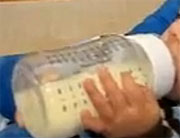
WEDNESDAY, Oct. 17 (HealthDay News) — When the introduction to solid foods is delayed and babies are fed formula for a prolonged period of time, it may place them at increased risk for pediatric acute lymphoblastic leukemia (ALL), a new study suggests.
But the study, which is considered preliminary, only found an association between prolonged bottle feeding and ALL; it did not prove a cause-and-effect relationship.
According to the U.S. National Library of Medicine, ALL is a fast-growing cancer of white blood cells called lymphocytes. It is also the most common acute childhood leukemia, typically affecting children between the ages of 3 and 7.
In the new study, researchers from the University of Texas at Austin found that children’s risk for this cancer seemed to increase the longer they were fed formula and not solid foods. They said the benefits that breast milk has on babies’ developing immune systems may help explain their findings.
The study was scheduled to be presented Wednesday at the annual cancer prevention conference of the American Association for Cancer Research (AACR) in Anaheim, Calif.
“For every month that a child was fed formula, taking into account other feeding practices, we found that the risk for this type of cancer was higher,” explained Jeremy Schraw, a graduate student at The University of Texas at Austin in an AACR news release. “If a baby is fed only formula, he or she will not be getting any immune factors from the mother, which could be leading to this greater risk.”
In conducting the study, the researchers surveyed 142 ethnically diverse children with ALL and 284 similar children who did not have this disease. They found the children diagnosed with ALL began eating solid foods much later than those who did not have this form of cancer. A greater number of children with ALL were also fed formula for a prolonged period of time and had mothers who smoked during their pregnancy, the study said.
The study showed that for each additional month of formula feeding, the children’s risk of cancer increased by 16 percent.
Research presented at medical meetings is considered preliminary until published in a peer-reviewed journal.
More information
The U.S. National Library of Medicine has more information on childhood acute lymphoblastic leukemia.

